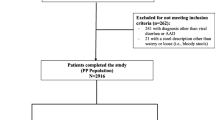Summary
Studies were conducted on the effects of antibiotics on intestinal bacterial flora and symptomatic changes associated with possible superinfection following antibiotic treatment. Following the administration of oral antibiotics, there were no marked changes in the intestinal flora. After second and third-generation cephems were injected, most bacteria, excludingStreptococcus faecalis which is resistant to them, decreased and fungi increased. The incidences of diarrhea after administering oral antibiotics were high for amoxicillin and amoxicillin + clavulanic acid. In some patients with depressed immunity, such as leukemic patients and neonates, decreases in intestinal bacteria after doses of antibiotics led to increases in pathogenic bacteria. They invaded the circulating blood, leading to septicemia. Septicemia originating in the intestinal tract was frequently associated with the development of vitamin K deficiency. Besides changes in the intestinal flora, a decrease in oral food intake and the presence of a methylthiotetrazole group in the structure of the administered antibiotics were also found to play a crucial role in causing vitamin K deficiency
Zusammenfassung
Der Einfluß von Antibiotika auf die Bakterienflora des Darmes und die mit möglichen Superinfektionen nach Antibiotikatherapie assoziierten Befund-Änderungen wurden untersucht. Nach oraler Antibiotikatherapie fanden sich in der Darmflora keine wesentlichen Änderungen. Nach der Injektion von Cephemen der zweiten und dritten Generation verminderten sich jedoch die meisten Bakterien mit Ausnahme vonStreptococcus faecalis, der gegen dieses Medikament resistent ist, und Pilze vermehrten sich. Mit oraler Therapie mit Amoxicillin und Amoxicillin plus Clavulansäure war eine hohe Inzidenz von Diarrhöe assoziiert. Bei manchen Patienten mit geschwächter Abwehr, wie Leukämiepatienten und Neugeborenen, führte die Abnahme der Darmbakterien zu einer Zunahme pathogener Bakterien; sie drangen in den Blutkreislauf ein und verursachten Septikämien. Septikämien, die vom Darmtrakt ausgingen, waren häufig mit der Entwicklung von Vitamin K-Mangel assoziiert. Neben Veränderungen der Darmflora sind Verminderung der oralen Nahrungsaufnahme und die Gabe von Antibiotika mit einer Methylthiotetrazol-Gruppe wichtige Determinanten für den Vitamin K-Mangel.
Similar content being viewed by others
Literature
Meguro, T., Yamada, K. A simple and rapid test for PIVKA II in plasma. Thromb. Res. 25 (1982) 109–114.
Meguro, T., Miyaji, Y., Yamada, K. A simple and rapid method for the assay of PIVKA-II and its practical use for the clinical cases. Blood Vessels 13 (1982) 211–214.
Mitsuoka, T. Intestinal bacterial flora and its significance. Clin. Bacteriol. 2 (1975) 55–97.
Hotta, M. Intestinal bacterial flora and infection in neonates. Journal of the Japanese Association for Infectious Diseases 57 (1983) 405–417.
Sunakawa, K., Hara, N., Kikuchi, T., Oikawa, T., Ichihashi, Y. Les effects des antibiotiques sur la flore bactérienne intestinale chez les souris élevées sans germe. Sciences Médicales 7 (1976) 393–399.
Sunakawa, K., Iwata, S. The administration of antibiotics and intestinal bacterial flora. J. Japan. Med. Assoc. 90 (1983) 2361–2368.
Heimdahl, A., Nord, C. E., Weilander, K. Effect of bacampicillin on human mouth, throat and colon flora. Infection 7 Suppl. 5 (1979) S446-S451.
Bentley, R., Meganathan, R. Biosynthesis of vitamin K in bacteria. Microbiol. Rev. 46 (1982) 241–280.
Almquist, H. J. Vitamin K: discovery, identification, synthesis, function. Fed. Proc. 38 (1979) 2687–2689.
Hooper, C. A., Haney, B. B., Stone, H. H. Gastrointestinal bleeding due to vitamin K deficiency in patients on parenteral cefamandole. Lancet I (1980) 39–40.
Reddy, J., Bailey, R. R. Vitamin K deficiency developing in patients with renal failure treated with cephalosporin antibiotics. N. Z. Med. J. 92 (1980) 378–379.
Neu, H. C. The new beta-lactamase-stable cephalosporins. Ann. Intern. Med. 97 (1982) 408–419.
Neu, H. C. Adverse reaction to cephalosporin antibiotics. Prog. Med. 3 (1983) 606–613.
Author information
Authors and Affiliations
Rights and permissions
About this article
Cite this article
Sunakawa, K., Akita, H., Iwata, S. et al. Clinical superinfection and its attendant symptomatic changes in pediatrics. Infection 13 (Suppl 1), S103–S111 (1985). https://doi.org/10.1007/BF01644229
Issue Date:
DOI: https://doi.org/10.1007/BF01644229




